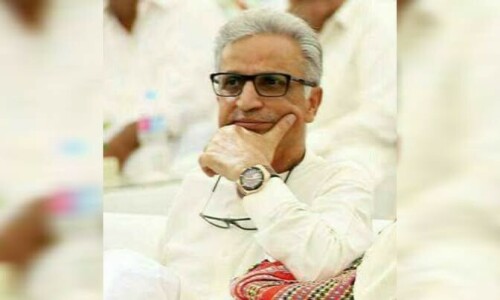Under pressure govt backtracks on Atif Mian's appointment; removes economist from advisory council
The Pakistan Tehreek-i-Insaf (PTI) government has asked Princeton University economist Atif R. Mian to step down from the Prime Minister Imran Khan-led Economic Advisory Council (EAC), PTI Senator Faisal Javed Khan announced on Friday.
The decision follows mounting pressure from religiopolitical parties against the appointment of Dr Mian, who is an Ahmadi.
According to a tweet by Senator Javed, Mian has agreed to give up his position on the council. A replacement will be announced later, he added.
Minister of Information Fawad Chaudhary later confirmed the development, saying the government has decided to withdraw the nomination of Dr Mian from the EAC because it wants to avoid division.
Editorial: Prejudice against minorities at top political levels is unacceptable
"The government wants to move forward alongside scholars and all social groups, and it is inappropriate if a single nomination creates an impression to the contrary," he tweeted.
In a second tweet, Chaudhry said the ideal state, according to Prime Minister Khan, is of Madina and that the premier and members of his cabinet hold Prophet Muhammad (PBUH) in high esteem.
"Khatm-i-Nabuwwat [belief in the finality of the prophethood] is a part of our faith and the recent success achieved by the government in the matter of blasphemous sketches is reflective of the same connection," he wrote.
The appointment of Dr Mian of Princeton University (Department of Economics and Woodrow Wilson School of Public Policy) to the 18-member EAC set up to advise the government on economic policy was opposed by some individuals and groups, including Tehreek-i-Labbaik Pakistan (TLP), who objected to his Ahmadi faith.
The news of his removal from the body comes as a surprise since the PTI government had only three days ago defended the academic's nomination, saying in categorical terms that it will "not bow to extremists".
"Pakistan belongs as much to minorities as it does to the majority," Information Minister Chaudhary had told a press conference in Islamabad, amidst a vicious online campaign targeting Dr Mian for his Ahmadiyya faith.
Chaudhry had taken to Twitter to recall that "Quaid e Azam Mohammad Ali Jinnah appointed Sir Zafar Ullah [also an Ahmadi] as Foreign minister of Pakistan; we'll follow [the] principles of Mr Jinnah, not of extremists."
His thoughts were echoed by Minister of Human Rights Shireen Mazari, who tweeted: "Exactly. Well put indeed. Time to reclaim space for the Quaid's Pakistan!".
The first meeting of the recently reconstituted EAC was presided over by Prime Minister Imran Khan on Thursday, but it could not be attended by three international economists of Pakistani origin, including Dr Mian, because of technical reasons.
“They could not make it because our web-link was down,” an official told Dawn.
Smear campaign
A social media smear campaign had erupted against the economist's appointment, with many calling for his removal.
A call-to-attention notice had also been submitted in the Senate by opposition parties against Mian's inclusion in the EAC. The notice bore the signatures of the PML-N, Muttahida Majlis-i-Amal and the Pakhtunkhwa Milli Awami Party members.
No member of the PPP had signed the document, with the party making it clear that it would not be part of a witch-hunt based on someone's faith.
A large number of supporters had also defended Mian's appointment on social media, saying that one's religion should not factor into their professional qualifications or employment.
Dr Mian has served as a professor of economics, public policy and finance at Princeton University and as director of The Julis-Rabinowitz Centre for Public Policy and Finance at Woodrow Wilson School. He is the only Pakistani to be considered among International Monetary Fund’s ‘top 25 brightest young economists’.
Ahmadis were declared non-Muslims in Pakistan through a constitutional amendment passed on September 7, 1974 during the tenure of Zulfikar Ali Bhutto.
This measure was later followed with Gen Ziaul Haq making it a punishable offence for Ahmadis to call themselves Muslim or to refer to their faith as Islam.














































